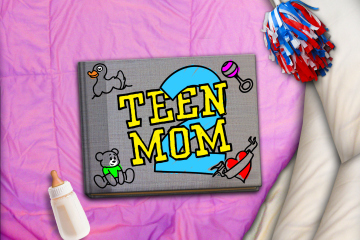
In 2009, six pregnant teens allowed MTV to film their pregnancies in the hopes that youngsters watching the resultant show — 16 and Pregnant — would learn from their mistakes and wait to start families. (They were also hoping for good ratings, of course.)
Four years into 16 and Pregnant‘s run, teen pregnancy rates are at a record low. Births to teen moms have been steadily dropping since 1991, down 44 percent in nine years, according to the CDC. Rates dropped nine percent from 2009 to 2010 alone, reaching a historic low of 34.3 births per 1000 women aged 15-19. Considering that 16 and Pregnant premiered in the summer of 2009, it’s tempting to wonder whether the show is in some way responsible.
A study featured in the New York Times Monday and conducted by the National Bureau of Economic Research, asserts that the popular show reduced teen births by nearly six percent just in 2010. But a different study conducted by researchers at Indiana University published Thursday found the opposite to be true: 16 and Pregnant and its spinoff show, Teen Mom, lead viewers to think that teen mothers have an enviable quality of life. So which is it: do these MTV shows encourage or discourage teen pregnancy? Or are they having no effect at all since determining the link between media and behavior is almost impossible to do?
16 and Pregnant was originally designed by MTV to show viewers (mostly young women) what life as a pregnant teen was really like. Every time the show airs, MTV promotes a website called StayTeen.org that “encourage[s] you to enjoy your teen years and avoid the responsibilities that come with too-early pregnancy and parenting.” The site provides information about birth control, STDs and dating abuse.
But after the show became a hit (episodes can draw up to two million viewers), parents and educators worried that 16 and Pregnant glamorized teen pregnancy. “Only 40 percent of teenage mothers ever graduate high school; two-thirds of families begun by an unmarried teen mother are poor. So what does MTV do? It shows how cool teen pregnancy is with a new reality series,” one review of the show by the Media Research Center, which offers a guide for appropriate television to parents, reads. And the fact that many of the show’s stars become celebrities in their own right — gracing the cover of People magazine — doesn’t hurt the impression that having a child while in high school is one way to get attention.
MTV created a spinoff show, Teen Mom partly in response to such criticism. Whereas 16 and Pregnant only traces the nine months leading to birth, Teen Mom follows the lives of the same teens after the baby showers are over and the reality of life with a baby sets in. A typical episode of the show follows the new moms a they fight with the fathers of their children (many of whom have now left them), fight with their parents (who are usually supporting them), struggle financially, struggle to finish their degree and watch their friends enjoy prom and college without them.
Yet some suspected even Teen Mom was having a copycat effect. The New York Post pointed out in 2011 that three of Teen Mom 2 star Janelle Evans’ friends had gotten pregnant within a year of Evans starring on the show. Nobody knows whether these friends purposely became pregnant to follow in Evans’ footsteps and potentially garner media attention, but clearly Evans did not serve as the cautionary tale she was supposed to be even to her closest friends. And just the existence of the show can normalize teen pregnancy.
And yet teen birth rates continue to drop.
The teen mom scenario highlights the difficulties researchers face when trying to measure how (and whether) media actually influences behavior. For years, researchers have been trying to draw a connection between violent video games and violent behavior. And though most recent research has concluded video games do not cause such behavior, contradicting studies seem to come out every week. (Obama said in Jan. 2013 that research on media violence is inconclusive and that he wants more studies on the topic.) Meanwhile, crime rates are down in the U.S. overall.
Similarly, researchers are struggling to determine how reality TV shows like 16 and Pregnant affect the life decisions of teenagers in a whole variety of demographics. So it’s not surprising both of these new contradictory studies have flaws.
The study suggesting a link between the show and a drop in pregnancy rates, conducted by the National Bureau of Economic Research, found that the rate of teenage pregnancy declined faster in areas where teenagers were watching more MTV programming. After crunching the numbers, they concluded that the shows prevented more than 20,000 births to teen mothers in 2010 alone.

“The assumption we’re making is that there’s no reason to think that places where more people are watching more MTV in June 2009 would start seeing an excess rate of decline in the teen birthrate, but for the change in what they’re watching,” Mr. Levine told the Times. Though researchers who reviewed the study said the results are sound, it only proves correlation, not causation. The study does not rule out other factors, like increased sex education at schools in those same areas where families can afford to pay for cable television and allow their children to watch a liberal channel like MTV. As TIME pointed out in 2011, Teen Mom almost exclusively tells the stories of white, middle class girls. Anyone who does not fit that demographic has a hard time relating to the show.
By contrast, the Indiana University study surveyed 185 high school students (who were more representative racially and socio-economically of the national demographic) and found that viewers who frequently watched 16 and Pregnant and Teen Mom had the unrealistic perception that teen moms have a lot of time to themselves, can easily find child care, will complete school, have affordable access to health care, finished college and lived on their own.
Researchers theorized this was because many of the girls featured in the two shows had become celebrities and therefore role models. “Maybe that’s what’s drawing viewers’ attention: the fact that one of the teen moms, Farrah Abraham, repeatedly is on the cover of Us Weekly for all the plastic surgery that she’s had. Well, a teen mom living in this country can’t afford that; most unmarried teen mothers are on welfare,” researcher Nicole Martins said. (Mom of the year, Abraham — pictured above — has leaked a sex tape, been photographed giving lap dances and skyrocketed to reality TV stardom on VH1 show, Couples Therapy.)
But just because frequent watchers of the show may have skewed views about teen pregnancy doesn’t mean that they will attempt to get pregnant themselves. After all, young boys playing Grand Theft Auto may think that stealing cars leads to a glamorous, rich lifestyle, but that doesn’t mean they’re dropping out of college to steal cars instead.
Yes, there are always the horror stories like the 2008 Gloucester High School pregnancy pact in which 17 girls agreed to get pregnant together. (This was before 16 and Pregnant and Teen Mom were on the air, but at the time critics blamed recent movies like Knocked Up and Juno for romanticizing pregnancy.)
But such purposeful pregnancies have much deeper roots than seeing a movie or a TV show. Amanda Ireland, who graduated from Gloucester High in 2008 after giving birth her freshman year of high school, said at the time of her schoolmate’s pregnancy pact, “They’re so excited to finally have someone to love them unconditionally. I try to explain it’s hard to feel loved when an infant is screaming to be fed at 3 a.m.” Family and social circumstances are much more likely to be factors in a teen’s decision-making process about becoming pregnant than media — though media may play some part.
The most insightful study on this topic is perhaps an earlier Indiana University study published in Sexuality & Culture in 2012 that found how 16 and Pregnant affects teens depends on their family background. This study — which surveyed 313 female undergrads at two universities — found that frequent viewers of the programs whose fathers often spoke with them about sex education and the ramifications of unprotected sex were less likely to have recently had sex. Viewers whose fathers rarely offered them information about sex, were more likely to have recently engaged in sexual relations. (For whatever reason, the study did not look at the mother-daughter relationship.) The show didn’t influence the girls’ sexual choices so much as their relationship with their parents and background in sex education did.
Spreading the word about contraception, birth control and the risks of unprotected sex through popular media may be having some positive effect. Glamorizing teen pregnancy may be diminishing that effect. But either way, MTV can’t do the work of the adults in the lives of teenagers. The 2012 study echoes other research that indicates what matters most when it comes to sex ed is what kids hear at home and in schools.
More Must-Reads From TIME
- The 100 Most Influential People of 2024
- The Revolution of Yulia Navalnaya
- 6 Compliments That Land Every Time
- Stop Looking for Your Forever Home
- If You're Dating Right Now , You're Brave: Column
- The AI That Could Heal a Divided Internet
- Fallout Is a Brilliant Model for the Future of Video Game Adaptations
- Want Weekly Recs on What to Watch, Read, and More? Sign Up for Worth Your Time
Write to Eliana Dockterman at eliana.dockterman@time.com